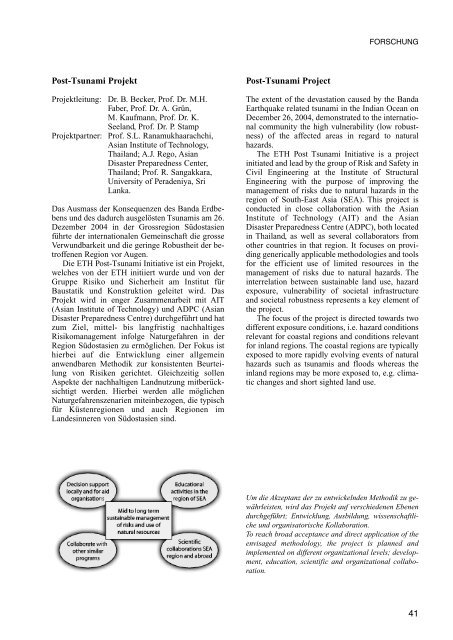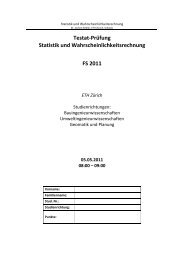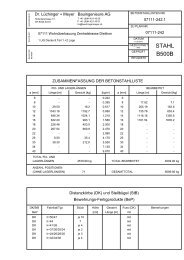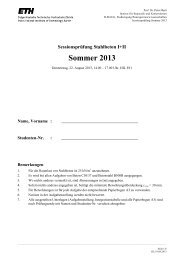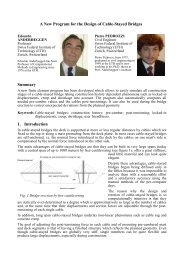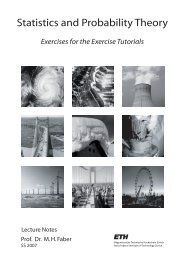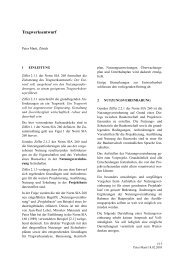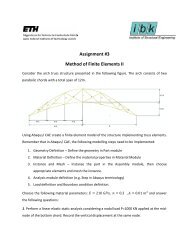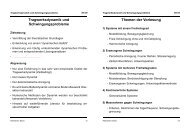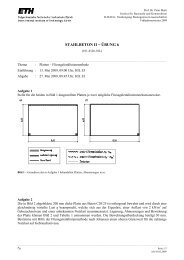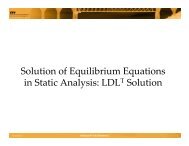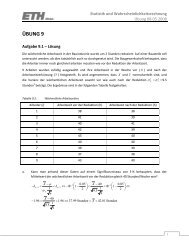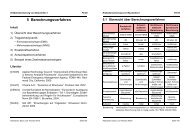IBK Jahresbericht 2004-2006 - Institut für Baustatik und Konstruktion ...
IBK Jahresbericht 2004-2006 - Institut für Baustatik und Konstruktion ...
IBK Jahresbericht 2004-2006 - Institut für Baustatik und Konstruktion ...
Erfolgreiche ePaper selbst erstellen
Machen Sie aus Ihren PDF Publikationen ein blätterbares Flipbook mit unserer einzigartigen Google optimierten e-Paper Software.
FORSCHUNG<br />
Post-Tsunami Projekt<br />
Projektleitung: Dr. B. Becker, Prof. Dr. M.H.<br />
Faber, Prof. Dr. A. Grün,<br />
M. Kaufmann, Prof. Dr. K.<br />
Seeland, Prof. Dr. P. Stamp<br />
Projektpartner: Prof. S.L. Ranamukhaarachchi,<br />
Asian <strong>Institut</strong>e of Technology,<br />
Thailand; A.J. Rego, Asian<br />
Disaster Preparedness Center,<br />
Thailand; Prof. R. Sangakkara,<br />
University of Peradeniya, Sri<br />
Lanka.<br />
Das Ausmass der Konsequenzen des Banda Erdbebens<br />
<strong>und</strong> des dadurch ausgelösten Tsunamis am 26.<br />
Dezember <strong>2004</strong> in der Grossregion Südostasien<br />
führte der internationalen Gemeinschaft die grosse<br />
Verw<strong>und</strong>barkeit <strong>und</strong> die geringe Robustheit der betroffenen<br />
Region vor Augen.<br />
Die ETH Post-Tsunami Initiative ist ein Projekt,<br />
welches von der ETH initiiert wurde <strong>und</strong> von der<br />
Gruppe Risiko <strong>und</strong> Sicherheit am <strong>Institut</strong> <strong>für</strong><br />
<strong>Baustatik</strong> <strong>und</strong> <strong>Konstruktion</strong> geleitet wird. Das<br />
Projekt wird in enger Zusammenarbeit mit AIT<br />
(Asian <strong>Institut</strong>e of Technology) <strong>und</strong> ADPC (Asian<br />
Disaster Preparedness Centre) durchgeführt <strong>und</strong> hat<br />
zum Ziel, mittel- bis langfristig nachhaltiges<br />
Risikomanagement infolge Naturgefahren in der<br />
Region Südostasien zu ermöglichen. Der Fokus ist<br />
hierbei auf die Entwicklung einer allgemein<br />
anwendbaren Methodik zur konsistenten Beurteilung<br />
von Risiken gerichtet. Gleichzeitig sollen<br />
Aspekte der nachhaltigen Landnutzung mitberücksichtigt<br />
werden. Hierbei werden alle möglichen<br />
Naturgefahrenszenarien miteinbezogen, die typisch<br />
<strong>für</strong> Küstenregionen <strong>und</strong> auch Regionen im<br />
Landesinneren von Südostasien sind.<br />
Post-Tsunami Project<br />
The extent of the devastation caused by the Banda<br />
Earthquake related tsunami in the Indian Ocean on<br />
December 26, <strong>2004</strong>, demonstrated to the international<br />
community the high vulnerability (low robustness)<br />
of the affected areas in regard to natural<br />
hazards.<br />
The ETH Post Tsunami Initiative is a project<br />
initiated and lead by the group of Risk and Safety in<br />
Civil Engineering at the <strong>Institut</strong>e of Structural<br />
Engineering with the purpose of improving the<br />
management of risks due to natural hazards in the<br />
region of South-East Asia (SEA). This project is<br />
conducted in close collaboration with the Asian<br />
<strong>Institut</strong>e of Technology (AIT) and the Asian<br />
Disaster Preparedness Centre (ADPC), both located<br />
in Thailand, as well as several collaborators from<br />
other countries in that region. It focuses on providing<br />
generically applicable methodologies and tools<br />
for the efficient use of limited resources in the<br />
management of risks due to natural hazards. The<br />
interrelation between sustainable land use, hazard<br />
exposure, vulnerability of societal infrastructure<br />
and societal robustness represents a key element of<br />
the project.<br />
The focus of the project is directed towards two<br />
different exposure conditions, i.e. hazard conditions<br />
relevant for coastal regions and conditions relevant<br />
for inland regions. The coastal regions are typically<br />
exposed to more rapidly evolving events of natural<br />
hazards such as tsunamis and floods whereas the<br />
inland regions may be more exposed to, e.g. climatic<br />
changes and short sighted land use.<br />
Um die Akzeptanz der zu entwickelnden Methodik zu gewährleisten,<br />
wird das Projekt auf verschiedenen Ebenen<br />
durchgeführt; Entwicklung, Ausbildung, wissenschaftliche<br />
<strong>und</strong> organisatorische Kollaboration.<br />
To reach broad acceptance and direct application of the<br />
envisaged methodology, the project is planned and<br />
implemented on different organizational levels; development,<br />
education, scientific and organizational collaboration.<br />
41


